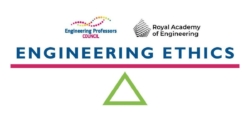 In developing the cases and articles for the EPC’s Engineering Ethics toolkit the authors and advisory group took into account recent scholarship on best practices in teaching engineering ethics through case studies – see further information on this below. They also reviewed existing case study libraries in order to add to the growing body of material available on engineering ethics, examples of which can be found here.
In developing the cases and articles for the EPC’s Engineering Ethics toolkit the authors and advisory group took into account recent scholarship on best practices in teaching engineering ethics through case studies – see further information on this below. They also reviewed existing case study libraries in order to add to the growing body of material available on engineering ethics, examples of which can be found here.
Best practices for developing and using case studies in teaching engineering ethics:
- Use a conceptual framework to make cases relevant, realistic, engaging, challenging, and instructional (Kim et al., 2006).
- Use a narrative style; Provide the opportunity for students to consider, revisit, and refine their responses and perspectives (Herreid, 2007).
- Move beyond a limited focus on ethics of duty and the corresponding emphasis on professional codes (Swan, Kulich, & Wallace, 2019).
- Move beyond internalist, individualist cognitive frameworks (Conlon & Zandvoort, 2011).
- Include emotion and imagination (Walling, 2015).
- Create cases with nuance that can be incorporated into broader ethics instruction and integrate ethics research (Lawlor, 2021).
- Provide opportunities for technical micro-insertion (Davis, 2006).
- Promote critical thinking (Lennerfors, Fors, & Woodward, 2020).
- Relate to realistic professional engineering situations and practice (Valentine et al., 2020).
- Incorporate macro- and micro-ethical considerations; couple ethics and equity (Rottman & Reeve, 2020).
- Provide opportunities to employ a range of activities and learning experiences (Herkert, 2000).
References:
Conlon, E. and Zandvoort, H. (2011) ‘Broadening ethics teaching in engineering: Beyond the individualistic approach’, Science and Engineering Ethics, 17(2), pp.217-232.
Davis, M. (2006) ‘Integrating ethics into technical courses: Micro-insertion’, Science and Engineering Ethics, 12(4), pp.717-730.
Herkert, J.R. (2000) ‘Engineering ethics education in the USA: Content, pedagogy, and curriculum’, European Journal of Engineering Education, 25(4), pp.303-313.
Herreid, C.F. (2007) Start with a Story: The Case Study Method of Teaching College Science. Arlington, VA: NSTA Press.
Kim, S., Phillips, W.R., Pinsky, L., Brock, D., Phillips, K. and Keary, J. (2006) ‘A conceptual framework for developing teaching cases: a review and synthesis of the literature across disciplines’, Medical Education, 40(9), pp.867-876.
Lawlor, R. (2021) Plea for more nuanced use of engineering ethics case studies. Available at: https://www.sefi.be/2021/04/12/plea-for-more-nuanced-use-of-engineering-ethics-case-studies/.
Lennerfors, T. T., Fors, P., and Woodward, J.R. (2020) ‘Case hacks: Four hacks for promoting critical thinking in case-based management education for sustainable development’, Högre Utbildning, 10(2), pp.1-15.
Rottman, C. and Reeve, D. (2020) ‘Equity as rebar: Bridging the micro/macro divide in engineering ethics education’, Canadian Journal of Science, Mathematics and Technology Education, 20(1), pp.146-165.
Swan, C., Kulich, A., and Wallace, R. (2019) A Review of ethics cases: Gaps in the engineering curriculum. Paper presented at 2019 Annual American Society of Engineering Education Annual Conference & Exposition.
Valentine, A., Lowenhoff, S., Marinelli, M., Male, S. and Hassan, G.M. (2020) ‘Building students’ nascent understanding of ethics in engineering practice’, European Journal of Engineering Education, 45(6), pp.957-970.
Walling, O. (2015) ‘Beyond ethical frameworks: Using moral experimentation in the engineering ethics classroom’, Science and Engineering Ethics, 21(6), pp.1637-1656.
Any views, thoughts, and opinions expressed herein are solely that of the author(s) and do not necessarily reflect the views, opinions, policies, or position of the Engineering Professors’ Council or the Toolkit sponsors and supporters.




